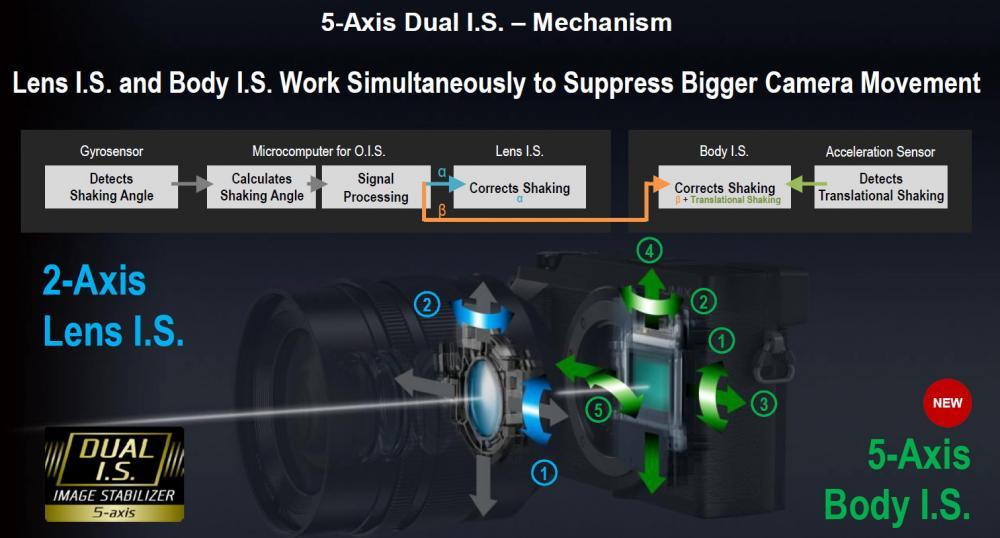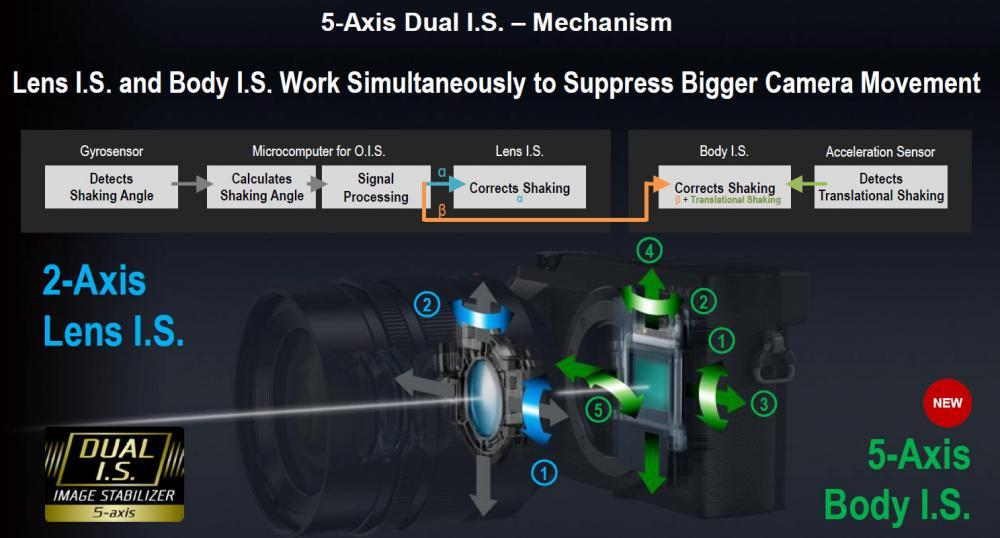-
Posts
1,222 -
Joined
-
Last visited
Content Type
Profiles
Forums
Articles
Everything posted by John Matthews
-
I got mine from www.digit-photo.com simply because they were the first to have in France. You could buy it anywhere though. In France, I always have a preference for amazon.fr because of a crazy-good return policy if you're not happy. Returned GX7 after using for 2 weeks and taking over 1000 photos, but then the GX80 came out; so, sent it back. Bonne chance!
-
Yes. You need the Panasonic adapter or a third party one. I bought the 3rd party one- works fine. Basically, you put a battery-shaped plug where the battery goes, but it has a cord coming out so you can plug it into an outlet. Bring a generator and you could theoretically go forever. There might be a way to "squeak" out 2 hours if you don't use the IBIS or viewfinder, turn down the screen to a max, and use a manual focus lens. Again, try that before.
-
It's called capitalism, guys. In the end, they'll all be obsolete; yet, they'll still be able to make stories in 2500 (if humanity still exists). Happy thoughts. The GX80/85 was never built with ergonomics as the priority... it's about size of the body, nothing else. Is the GX80/85 more in-line with what MFT is all about anyway or not? My guess it is because if you really want ergonomics, MFT is probably not the answer.
-
Yeah, this isn't the type of moiré that the human eye will see. I think many 1080p cameras would have this happen in this situation. Go with the 4k and downscale. Another question would be was this a Panasonic lens? The tend to be auto corrected for moiré... I think Panasonic makes a point of not having any sort of correction on non-Panasonic lenses.
-
My original comment was only concerning IBIS, not Dual IS. I would imagine Dual IS would be consistent with other cameras out there, meaning you get jitters... not a surprise. It would be interesting to see if OIS or IBIS is causing any jitters by turning off IBIS and leaving on OIS. Here's Jack from Panasonic, talking about IBIS. (picked up from 43rumors this morning).
-
Just a couple of thoughts... IBIS is only taking out my micro-jitters for me and offering a "gentle floating" to the video. If I move too much, you can see it. I can't walk and film really. Focus is always going to be a challenge- the GX80 will NOT autofocus on a moving subject if the camera itself is moving, manual focus is the only way. I agree that the marketing material is confusing and cagey at best. Nevermind the number of inquiries from us to know more about the HDMI port and codecs. They just don't answer. Nevertheless, I fully checked this out months ago before buying GX80. Andrew checked on this, along with countless reviewers to confirm 5-axis IBIS. My understanding of E-stabalization is that the camera takes a further crop, moving around the image on a X and Y axis on the sensor to further stabalize, meaning it's Hybrid 5-axis is 5-axis + extra stabalization (but it crops). Pitch and yaw would require sensor movements to compensate. I've never heard of software compensating for pitch and yaw. However, where do you see that "Body IBIS" is only 3-axis? I only read "normal" IBIS is "Camera shake is corrected for up/down, left/right, and rotational movements." On the face of that phrase, it sounds like 3-axis, but it never says that. Also, "rotational" can mean a lot. Given the confusion, I've come to believe that this is simply a poorly written manual, nothing else.
-
Not sure how the A7II works, but the Panasonic is marketing the GX80 as 5-axis IBIS with the possibility of 2 more in the lens. The A7II "looks" like 3-axis IBIS plus 2-axis in-lens and is noted by reviewers as being not as good as the Panasonic or Olympus options. The GX8's IBIS is said to be 4-axis and isn't as good as the GX80. I'm still confident that it's 5-axis IBIS, regardless of E-stabalization ON or OFF. I would approach the question "Does E-stabalization degrade the image?" the same way as I approach grading. Personally, I would rather have a choice later on... I doubt that Panasonic is doing better stabalization in software than the editors out there. Add to that the idea of a extra crop and I think the upside is only marginal... could be wrong though...
-
I am quite happy with the IBIS... I reckon it's one of the best on the market. I've read the chart I don't know how many times... it's clear in saying IBIS in all modes is available. Do a search for "3-axis" in the manual. This camera moves that sensor along 5 different axis as the graphic above exemplifies. E-stabalization only works in video mode, taking a further crop and doing more movement of the image in software, just like many camcorders out there would. I think it would be better to stabalize in post rather than use E-stabalization.
-
I've shot over 5 hours in varied environments and subjects... have yet to see moiré in 4k. I suggest you shoot 4k and downsample to 1080- processor intensive, but worth it. You should also note that moiré should appear on some subjects like a wicker basket- it's natural for our eyes to see too. Nope. Go back further in this thread and you'll see. Panasonic has made it crazy confusing for us, but 4k 5-axis IBIS with ALL lenses is its minimum capability.
-
I'm sure I'm getting a stabalized image... I would recognize my coffee shakies anywhere. Panasonic screwed the pooch on their charts- they just wanted everyone to remember that dual-IS was only possible with a Panasonic stabalized lens... which is true. "Body" does indeed mean 5-axis IBIS, regardless of the lens slapped on it. Put a Panasonic stabalized lens and you get dual-IS (5 IBIS + 2). Electronic crops- never really shot much with it because of that. "Hybrid" means a combination of 5-axis IBIS and electronic IS. "When [E-stabalization] is set to ON" is written on their chart to show that "Hybrid" (5-axis IBIS + electronic IS) is ONLY available in video mode, not photo mode. That comma just after "Body" in the bottom right-hand box is essential in understanding the chart. 5-axis "Body" stabalization is available in ALL 6 boxes on the chart. Try this: 1) put on a 50mm lens 2) turn off the stabalizer (no E-stabalization) 3) punch in focus and pull focus (note the shakies) 4) now, turn on the stabalizer (no E-stabalization), your shakies are now gone when you punch in.
-
There's been confusion about this since way back in this thread, even when it came out. The stabalizer mechanism in this camera is 5-axis-only IBIS with the option of turning off an axis for panning (never really tried it though). Just set the stabalizer Operation Mode to the "hand with four shaky marks" and set your focal length- work great, even in 4k.
-
Although I haven't done this myself, I believe @Andrew Reid mentioned it in his preliminary review of the GX80. This is what he said: "But there’s more… the camera’s new processor can record 4K to the SD card internally at 100Mbit/s AS WELL AS outputting the full 4K 422 feed to an external recorder for high bitrate ProRes at the same time. " So yes it does. It looks as though you're getting some really good colors with Davinci indeed... the greens are fantastic! Unfortunately, I don't have enough experience (or time) with it to say what a GX80 signal would produce... my impression is that you're 16 and 960 refer to a luma range... I thought it would appear at 0-255 on the GX80, but I'm not sure. I've seen this myself, but why would 8-bit Log files exist? All them have saturation and contrast increases after applying a LUT... videographers use them all the time for serious projects. Is it "o.k." with 8-bit Log, but not with non-log? I still find there's quite a bit of color in a sat = -5 GX80 file, sometimes I'd say it looks closer to what I saw.





